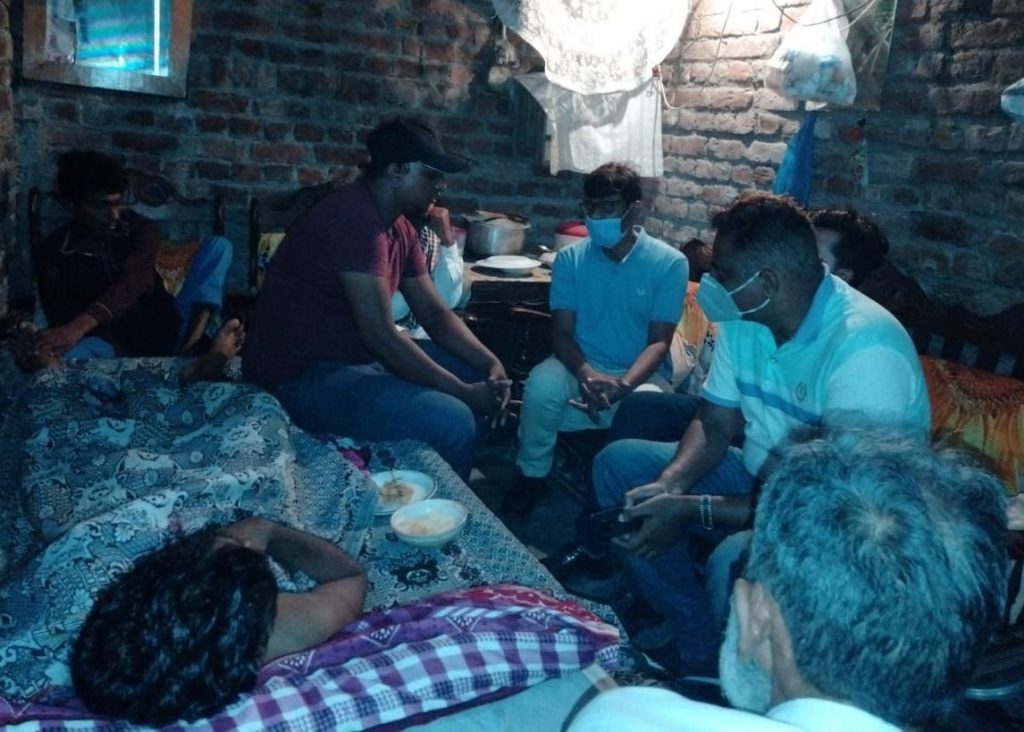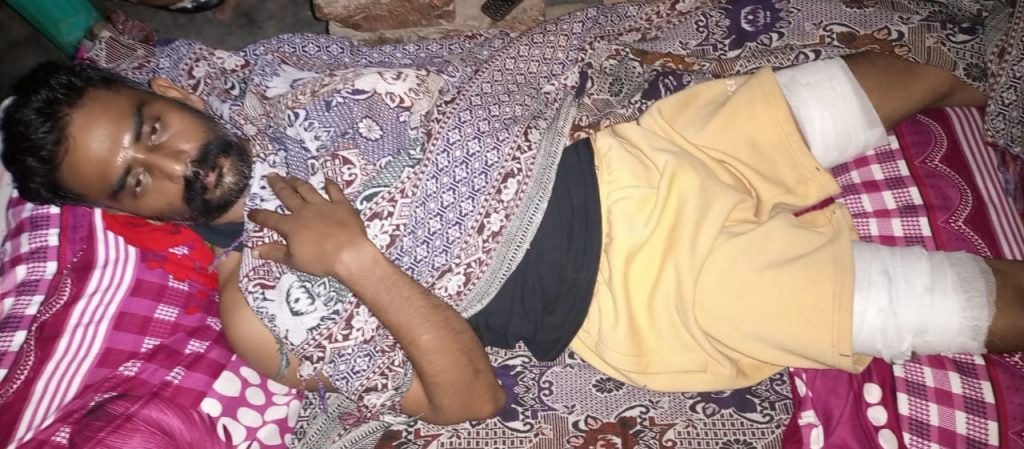
The most senior political leader of Pakistan’s minority Christians has complained of what he calls ‘prejudicial treatment’ by police in the way the force responded to a terrifying gun attack in a mixed faith neighborhood which injured at least seven, one of them critically ill and fighting for her life in hospital. Another victim was a young girl. She and four other wounded females all came from the same family, that of Kashif Masih, aged 28.
One, his six months’ pregnant wife Maria Masih, 22, was fortunate to escape serious injury after some six heavily armed men burst into the Shera Kot area of Lahore, the capital of Punjab province (and Pakistan’s second city) at 2.15pm on 6 September. Most men were away at work at the time.
When the Director-General of the Federal Ministry of Human Rights Muhammad Arshad presented the gun attack as a fight between two Christian groups to the Senate Standing Committee on Human Rights, Senator Michael Kamran vehemently objected, saying that he had visited the area to find out for himself what had happened. According to him, the police were protecting the gang of attackers as they were ‘influential’ locally.
Threats, intimidation and bribes often deter minority Christians from laying charges
Pakistani Christians, who – according to the most recent (2017) census – officially make up less than 2% of the population, are not treated fairly under the law. They see the perpetrators of crimes against them often escape charge, arrest and trial, especially if they are politically and socially influential. Frequently, this starts with what the police record in the First Information Report (FIR), upon which the rest of the legal process is built: Christians can be intimidated, often by hostile crowds who gather at the police station. The police can side with the perpetrators simply because they’re all Muslims. Sometimes bribes are used. In Islamic law, a woman or non-Muslim’s evidence is worth half that of a man; making a non-Muslim woman’s worth a quarter of that of a Muslim man.
One male victim of the 6 September attack, Asif Masih, 43, had arrived home from work minutes before he heard gunfire; he first thought it was fireworks. “As I rushed to see my children playing outside on the street, I saw a few men firing on the houses of Christians. I had hardly rushed my children inside the home and locked our gate when two bullets pierced its iron sheet and injured both my thighs.”
Twenty-three-year-old Mariam Masih’s house is close to the street entrance. “I heard a noise and thought it was fireworks. I went outside and saw men at the entrance of the street firing into the air.” She says she could hear them yelling abuse and insults – ‘Chuhra’ (a highly contemptuous term reserved only for Christians in Pakistan, equivalent to describing someone as ‘only fit to clean the toilets’) and shouting they ‘would teach the Chuhras [Christians] a lesson’.
The gunmen then fired into at least 17 houses – but not a single bullet, say witnesses, hit a Muslim’s house, even though there were no obvious signs to distinguish residents’ respective religion. This, local Christians say, shows that the gun attack was pre-planned. Samina Masih, 34, was hit in the stomach by three bullets.
“The police station is only yards away but they only arrived about 20 to 25 minutes later” Kashif Masih, who was at work at the time, told World Watch Monitor.
“The injured were shifted to Services Hospital where Samina underwent surgery; she’s still fighting for her life.
“I am thankful to God the bullet did not hit Maria anywhere to endanger her life or my unborn child” Kashif added. He said that his injured family would need treatment for months but that he expected that neither the state nor anyone else “was going to help us very poor Christians”.
Asif Masih was initially named as complainant on the First Information Report filed with the police. But he has now completely distanced himself in fear of his and his family’s lives. A sanitation worker in an orphanage, he earns only 14,000 Pakistani rupees (about $82 a month), not enough to send his children to school. “I can hardly provide food to my family. How can I even imagine fighting a legal battle with these heavily armed men?”
Pakistan’s Anti-Terrorism Act denies bail to suspects
Locals claimed the incident was so terrifying that there was sufficient evidence for it to come under ‘terrorism’: Pakistan’s 1997 Anti-Terrorism Act (ATA) defines it as all acts “designed to coerce and intimidate or overawe the government or the public or a section of the public or community or sect or create a sense of fear or insecurity in society”.
This would then stipulate a parallel set of procedures in special Anti-Terrorism Courts (ATCs) for “speedy trial” and policies such as the denial of bail to suspects, enhanced police powers, extended remand, preventive detention and so on. A key point is that the state itself is responsible for prosecution of a ‘terrorist’ offence, meaning victims would not have to face intimidation.
For example, in November 2014, a Christian couple, Shama and Shahzad Masih, was burned alive in the brick kiln where they worked as bonded laborers on the pretext of ‘blasphemy’ charges. The case was registered under the Anti-Terrorism Act. The police initially charged 102 people because a mob of at least 600 were involved in their deaths. All the suspects were released, except five, after police obtained statements from Shama’s brothers. Eventually, the five suspects were convicted.
In contrast, In 2009, more than 100 houses of Christians were looted, ransacked and then set on fire in Gojra, district Toba Tek Singh, about 200 kilometers from Lahore. Seven in one family, from grandparents to grandchildren, died after locking themselves into room to escape the mob who set fire to their house; only one survived as a witness.
In dozens of such acts of mob violence, attackers escaped conviction through the use of bribes, connections and threats.
For this reason, Senator Kamran Michael and other Christians wanted the police to register this latest case under the Anti-Terrorism Act so at least some of the attackers might be brought to justice.
But the police would not register the Shera Kot case as ‘terrorism’.
“This was an act of terrorism but the police have not invoked the anti-terrorism law, considered more punitive than the law around murder,” says advocate Javed Gill Coya, representing the victims. “Now the incident is being treated more like a riot between two groups where one resorted to using firearms that could cause manslaughter [not even murder].”
Shera Kot Police Station head Azeem Anwar denied this, saying that the state in fact wanted to become the complainant – but that the Christian community lawyers had expressed distrust:
“The state is with the victims. Even before the ambulances arrived, police rushed the injured to hospital. We have deployed four policemen for security in the area.”
Lawyer Coya, however, insisted there was no distrust: “The police are giving it a false color. All we wanted was to register the complaint as soon as possible with the correct facts.”

After Asif refused to pursue the case, Kashif said the five women victims wanted to instead. But the police insisted that the women could not allowed to do so. [Women can be complainants in Pakistan]. “The attack took place when only women were at home so how could a man take the case, except for Asif?” Kashif complained in frustration.
(In a comparison of how men and women experience religious persecution by different strategies, Christian men are more likely to face economic or social pressure because they are typically in workplaces, places of worship and so on much more than women, especially in a country like Pakistan).
Police chief Anwar said the attack has a history and should not be seen as against the wider community. “Only a day before, at Chaudhry Afzal Gujjar’s farmhouse, the attackers (from the Dogar caste) clashed with Gujjar’s workers – one of whom was [Christian] Nasir Masih, who lives in this neighborhood. So the [Dogar] wanted to settle a score with Nasir.”
This, however, does not fully explain why the attackers did not target Gujjar and why they attacked the houses of Christians. “None of the injured had any connection with Gujjar or the attackers” said Kashif.
Punjab Human Rights and Minority Affairs Minister Ejaz Alam Augustine confirmed there was apparently previous enmity between the attackers and a local Christian. “As soon as I knew about the incident, I contacted the Punjab Police Deputy Inspector General to ensure the complaint was registered and the injured were well taken care of.”
In Pakistani law, a victim’s family can agree a compromise over a murder/manslaughter charge. Threats or bribes are invariably used to force Christians to withdraw charges; all such past cases have therefore been inconclusive.
Anger at misreporting and failure to report hate speech
The Christians were therefore frustrated that the police blocked them from invoking the Anti-Terrorism Act – this would have stopped the intimidation of Asif. They were also angry at the misreporting and failure to report the hate speech. Senator Michael protested “The attackers were Muslims; they spared the houses of Muslims and they showered rounds of bullets on only Christians’ houses – for whom they had no enmity at all.
“In the last two decades, dozens of Christian neighborhoods have been attacked and set on fire after one local Christian is accused. This is the same mindset, they wanted to retaliate against one person, but instead attack all Christians’ houses as if they all are equally guilty!”
Police Station Head Anwar told World Watch Monitor about Shera Kot “This case is being handled by the investigation department; you need to ask them.” Despite repeated calls, investigation officers were not available for comment.
Michael promised that the Senate Standing Committee on Human Rights would investigate further.